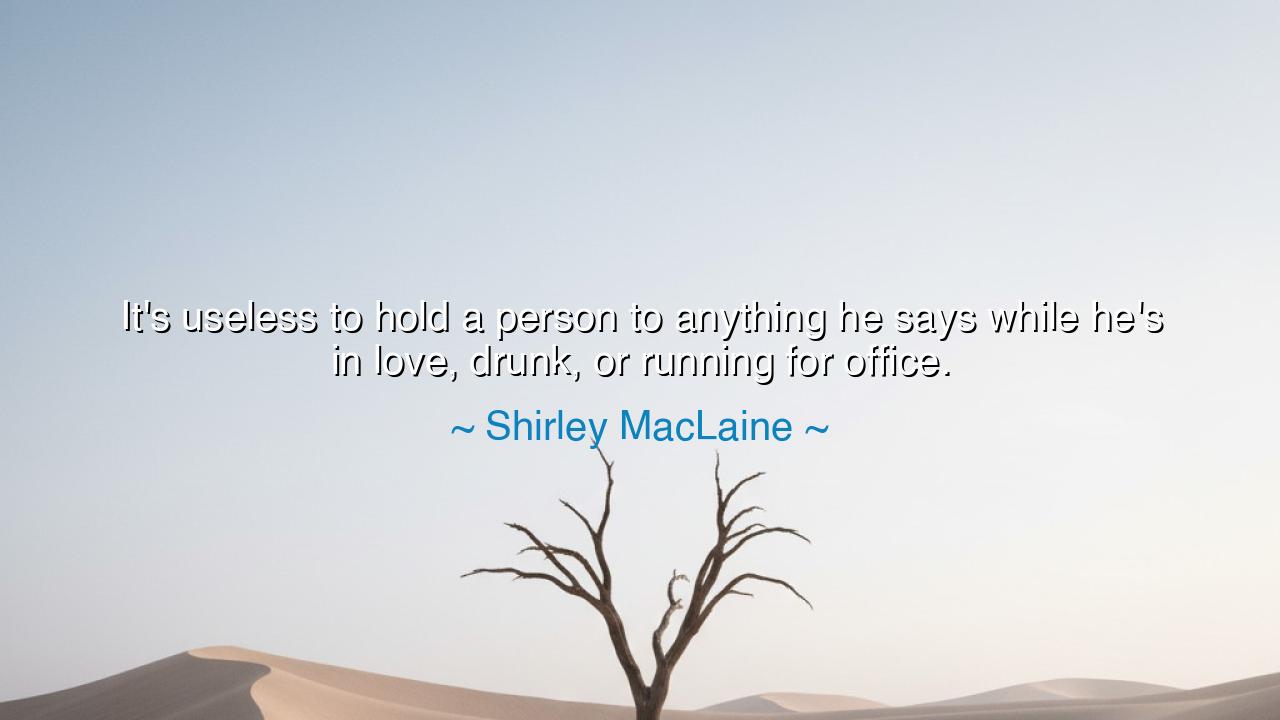
It's useless to hold a person to anything he says while he's in
It's useless to hold a person to anything he says while he's in love, drunk, or running for office.






“It’s useless to hold a person to anything he says while he’s in love, drunk, or running for office.” — Shirley MacLaine
Thus speaks Shirley MacLaine, the actress-philosopher who dances between wit and wisdom, whose words are wrapped in humor yet burn with truth. In this sharp and timeless observation, she captures the essence of human nature: that there are moments when reason abandons us, when passion, intoxication, or ambition seize the reins of the soul. In such states, words flow not from the calm of thought, but from the storm of feeling. To be in love, to be drunk, or to seek power — each is a form of madness, a sweet and dangerous fever. And so, she warns us with laughter and insight: do not bind the heart, the tongue, or the man by what he says in his fevered hour.
To be in love is to live in a dream where every promise feels eternal and every word seems sacred. Yet love’s speech is born of emotion, not judgment. When the heart overflows, it speaks of forever — not as deceit, but as sincerity within a fleeting state. A lover will swear to move mountains, to conquer the world, to change for another — and in that moment, they mean it truly. But the heart is a river, not a stone. When its flood recedes, the promises of love, uttered in fire, fade like the morning mist. Thus, MacLaine’s wisdom reminds us to forgive the exaggerations of love, for passion speaks a language that reason cannot sustain.
Likewise, when a man is drunk, his words are the echo of unguarded truth mingled with chaos. Drink loosens the chains of restraint, freeing both honesty and folly in equal measure. The drunkard may confess his fears, his desires, or his regrets — yet his words float between truth and illusion, colored by the delirium of the spirit. To hold him to those words is to expect clarity from smoke, wisdom from wind. The ancients said that wine reveals the soul, but they also knew that the revealed soul is not always the true one — for intoxication magnifies the moment and blinds the future.
And what of the one running for office? He, too, is drunk — not on wine or love, but on ambition. His intoxication is power, his lover the crowd, his desire the applause of men. In his pursuit, he will promise anything, pledge everything, speak with the fire of conviction he may not truly feel. This, too, is a fever — the fever of glory. The politician’s word, given in the heat of his chase, often fades when the crown is won. MacLaine, with her piercing humor, sees through this dance of masks: that ambition, like love or drink, bends truth to desire.
History is filled with the echoes of her truth. Napoleon Bonaparte, who swore he would bring peace to Europe, instead brought it to its knees. In his ambition, his words became dreams of empire. Cleopatra and Mark Antony, in love’s delirium, promised each other eternity, yet were undone by the world’s reality. And countless kings, prophets, and poets have spoken under the influence of passion or pride, only to awaken later in the cold light of reason. It is the oldest story in the world: the tongue runs faster than the soul when the heart or the hunger burns too bright.
But this is not cynicism — it is wisdom seasoned with mercy. MacLaine’s words remind us to temper our expectations of others, to see beyond the moment’s flame. For when people speak in love, in drink, or in ambition, they are not lying — they are living intensely. Their words reflect not deceit, but the truth of that moment’s heart. When the moment passes, their truth changes, as all human truth does. To hold them forever to those words is to chain them to a past self that no longer exists.
Therefore, O seeker of understanding, learn to listen with compassion and discernment. When you hear the lover’s promise, cherish it, but know it may fade. When you hear the drunkard’s confession, listen for the hurt behind the humor. When you hear the politician’s vow, seek not his words, but his actions. For wisdom lies not in believing every utterance, but in seeing the soul beneath it.
So let this be your teaching: judge not the words spoken in passion, but the deeds that follow in calm. For love, intoxication, and ambition are the storms that pass through every heart. Do not curse them — they make us human. But remember always: when the storm subsides, only truth remains. And it is by that truth, not by the fleeting promises of passion, that we must learn to walk.






AAdministratorAdministrator
Welcome, honored guests. Please leave a comment, we will respond soon